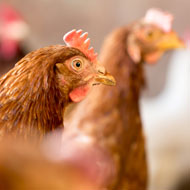Mutations could allow H7N9 to spread among humans

H7N9 usually infects birds but has spread to at least 779 humans in outbreaks linked to poultry markets.
Several genetic mutations could allow avian influenza H7N9 to spread from person to person, a team of international scientists has discovered.
H7N9 usually infects birds but has spread to at least 779 humans in outbreaks linked to poultry markets. While the virus cannot spread sustainably from person to person, scientists fear it could mutate into a form that can.
Led by James Paulson from The Scripps Research Institute (TSRI), researchers analysed mutations that could occur in the H7N9 genome, focusing on a gene that codes for the H7 hemagglutanin, a protein found on the surface of flu viruses that allows them to latch onto host cells.
Flu strains that circulate in avian viruses have different subtypes of hemagglutanin, called H1-H16, but so far only H1-H3 have been found in human flu viruses. H7N9 has specificity for receptors on bird cells, but not receptors on human cells, but a transition to human specificity could allow it to spread among humans.
Researchers used molecular modelling and knowledge of the hemagglutanin’s structure to pinpoint mutations that would cause a switch to human specificity. They produced the hemagglutanin with different combinations of the mutations in an experimental cell line, then harvested the mutant hemagglutanin protein from the cells.
Several forms with mutations in three amino acids bound far more strongly to human receptors, according to findings published in the journal PLOS Pathogens. In other words, they had switched specificity from bird to human. The triple-mutant H7 hemagglutanins also latched onto cells in samples of human trachea tissue.
Scientists were limited in their ability to test these effects in animals as safety regulations prohibit introducing the mutations to actual H7N9 viruses. However, researchers believe that observing the development of these mutations in humans with H7N9 could help to ensure a timely response to prevent a pandemic.



 The BSAVA has opened submissions for the BSAVA Clinical Research Abstracts 2026.
The BSAVA has opened submissions for the BSAVA Clinical Research Abstracts 2026.